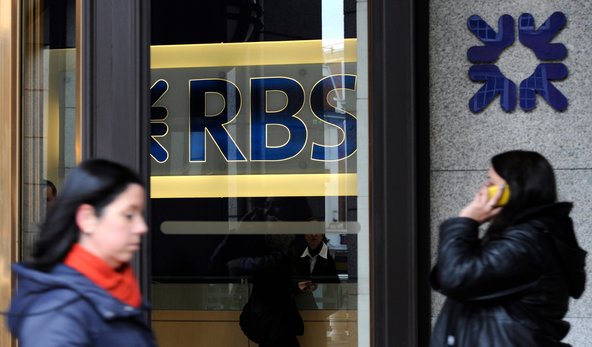 Facundo Arrizabalaga/European Pressphoto AgencyA branch of the Royal Bank of Scotland in London.
Facundo Arrizabalaga/European Pressphoto AgencyA branch of the Royal Bank of Scotland in London.
LONDON – The Royal Bank of Scotland, hammered by losses, announced plans on Thursday to sell assets and pare back its investment banking business, in an effort to appease regulators and its biggest shareholder, the British government.
R.B.S. said it planned to sell a stake in the Citizens Financial Group, the American lender it bought in 1988, through an initial public offering in two years. The bank will also continue to reduce its investment banking operations, with plans to cut risky assets and eliminate jobs.
The moves are designed to help bolster the bank’s capital levels and refocus its operations, part of a multiyear turnaround effort initiated by its chief executive, Stephen Hester. In the end, R.B.S. will emerge a much smaller bank, largely focused on Britain.
“R.B.S. is four years into its recovery plan,” Mr. Hester said in a statement, “and good progress has been made. We are a much smaller, more focused and stronger bank. Our target is for 2013 to be the last big year of restructuring.”
Like many rivals, R.B.S. is struggling with the legacy of the financial crisis and a spate of legal issues. On Thursday, it reported a bigger-than-expected loss, in part tied to its legal troubles.
The bank, in which the British government holds an 82 percent stake after a bailout in 2008, posted a net loss of £5.97 billion ($9 billion) in 2012, much larger than the £2 billion loss recorded in 2011. Analysts had been expecting a loss of £5.1 billion. For the last quarter of 2012, R.B.S. reported a £2.6 billion loss, up from a £1.8 billion loss in the period a year earlier.
The rising losses reflect the bank’s regulatory and legal problems.
R.B.S. said on Thursday that it had set aside an additional £1.1 billion to compensate clients to which it improperly sold insurance products, bringing the total provision to £2.2 billion. It also estimated it would have to pay £700 million to compensate small businesses to which it improperly sold some interest-rate hedging products.
The bank agreed this year to pay $612 million to British and American authorities to settle accusations of rate-rigging. Since then, Mr. Hester has promised to tighten controls at the bank to limit the risk of future rate manipulation.
The head of R.B.S.’s investment banking division, John Hourican, resigned at the beginning of February as a result of the scandal related to manipulating the London interbank offered rate, or Libor. The bank plans to pay its fine with money clawed back from bonuses.
‘‘Along with the rest of the banking industry we faced significant reputational challenges,’’ Mr. Hester said in the statement. ‘‘We are determined to overcome the cultural and reputational baggage of precrisis times with the same focus we have applied to the financial cleanup from that era.’’
Eager to get back some of the £45.5 billion it invested in R.B.S., the British government recently increased pressure on the bank’s management to speed up the reorganization.
Some analysts said the government could start selling parts of its investment in the bank, even at a loss, before the next general election, which is set for 2015. R.B.S.’s shares are still trading at about half what the government paid for them in 2008. Some lawmakers said they would favor handing out shares to the public instead of a possible sale of the stake on the open market.
Richard Hunter, head of equities at Hargreaves Lansdown Stockbrokers, said there were signs that Mr. Hester’s efforts to turn around the bank had started to pay off, but that “the ongoing absence of a dividend and overhang of the government stake are negatives which need to be resolved.”
Article source: http://dealbook.nytimes.com/2013/02/28/as-losses-mount-r-b-s-unveils-plan-to-sell-assets/?partner=rss&emc=rss